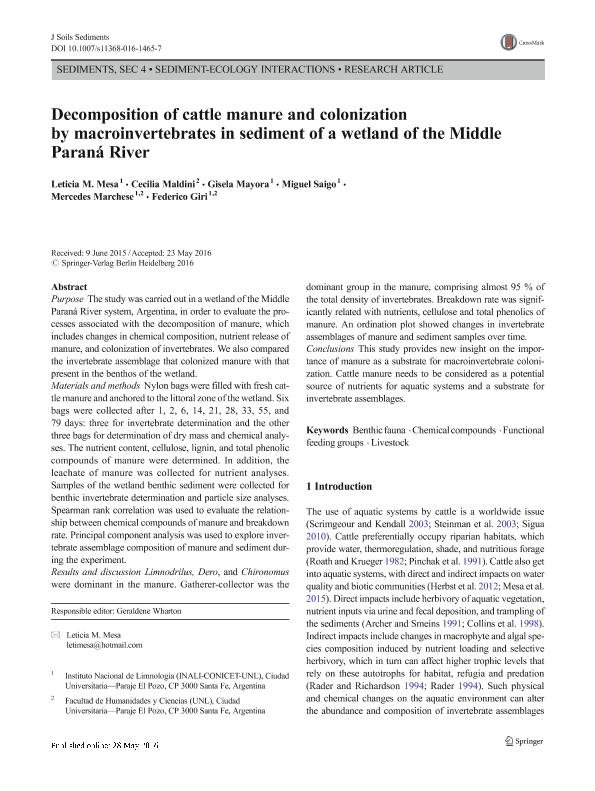Mostrar el registro sencillo del ítem
dc.contributor.author
Mesa, Leticia Mariana

dc.contributor.author
Maldini, Cecilia
dc.contributor.author
Mayora, Gisela Paola

dc.contributor.author
Saigo, Miguel

dc.contributor.author
Marchese Garello, Mercedes Rosa

dc.contributor.author
Giri, Federico

dc.date.available
2018-09-17T17:43:28Z
dc.date.issued
2016-09
dc.identifier.citation
Mesa, Leticia Mariana; Maldini, Cecilia; Mayora, Gisela Paola; Saigo, Miguel; Marchese Garello, Mercedes Rosa; et al.; Decomposition of cattle manure and colonization by macroinvertebrates in sediment of a wetland of the Middle Paraná River; Springer Heidelberg; Journal Of Soils And Sediments (print); 16; 9; 9-2016; 2316-2325
dc.identifier.issn
1439-0108
dc.identifier.uri
http://hdl.handle.net/11336/59895
dc.description.abstract
Purpose: The study was carried out in a wetland of the Middle Paraná River system, Argentina, in order to evaluate the processes associated with the decomposition of manure, which includes changes in chemical composition, nutrient release of manure, and colonization of invertebrates. We also compared the invertebrate assemblage that colonized manure with that present in the benthos of the wetland. Materials and methods: Nylon bags were filled with fresh cattle manure and anchored to the littoral zone of the wetland. Six bags were collected after 1, 2, 6, 14, 21, 28, 33, 55, and 79 days: three for invertebrate determination and the other three bags for determination of dry mass and chemical analyses. The nutrient content, cellulose, lignin, and total phenolic compounds of manure were determined. In addition, the leachate of manure was collected for nutrient analyses. Samples of the wetland benthic sediment were collected for benthic invertebrate determination and particle size analyses. Spearman rank correlation was used to evaluate the relationship between chemical compounds of manure and breakdown rate. Principal component analysis was used to explore invertebrate assemblage composition of manure and sediment during the experiment. Results and discussion: Limnodrilus, Dero, and Chironomus were dominant in the manure. Gatherer-collector was the dominant group in the manure, comprising almost 95 % of the total density of invertebrates. Breakdown rate was significantly related with nutrients, cellulose and total phenolics of manure. An ordination plot showed changes in invertebrate assemblages of manure and sediment samples over time. Conclusions: This study provides new insight on the importance of manure as a substrate for macroinvertebrate colonization. Cattle manure needs to be considered as a potential source of nutrients for aquatic systems and a substrate for invertebrate assemblages.
dc.format
application/pdf
dc.language.iso
eng
dc.publisher
Springer Heidelberg

dc.rights
info:eu-repo/semantics/openAccess
dc.rights.uri
https://creativecommons.org/licenses/by-nc-sa/2.5/ar/
dc.subject
Benthic Fauna
dc.subject
Chemical Compounds
dc.subject
Functional Feeding Groups
dc.subject
Livestock
dc.subject.classification
Otras Ciencias Biológicas

dc.subject.classification
Ciencias Biológicas

dc.subject.classification
CIENCIAS NATURALES Y EXACTAS

dc.subject.classification
Meteorología y Ciencias Atmosféricas

dc.subject.classification
Ciencias de la Tierra y relacionadas con el Medio Ambiente

dc.subject.classification
CIENCIAS NATURALES Y EXACTAS

dc.title
Decomposition of cattle manure and colonization by macroinvertebrates in sediment of a wetland of the Middle Paraná River
dc.type
info:eu-repo/semantics/article
dc.type
info:ar-repo/semantics/artículo
dc.type
info:eu-repo/semantics/publishedVersion
dc.date.updated
2018-09-14T13:24:42Z
dc.journal.volume
16
dc.journal.number
9
dc.journal.pagination
2316-2325
dc.journal.pais
Alemania

dc.journal.ciudad
Heidelberg
dc.description.fil
Fil: Mesa, Leticia Mariana. Consejo Nacional de Investigaciones Científicas y Técnicas. Centro Científico Tecnológico Conicet - Santa Fe. Instituto Nacional de Limnología. Universidad Nacional del Litoral. Instituto Nacional de Limnología; Argentina
dc.description.fil
Fil: Maldini, Cecilia. Universidad Nacional del Litoral. Facultad de Humanidades y Ciencias; Argentina
dc.description.fil
Fil: Mayora, Gisela Paola. Consejo Nacional de Investigaciones Científicas y Técnicas. Centro Científico Tecnológico Conicet - Santa Fe. Instituto Nacional de Limnología. Universidad Nacional del Litoral. Instituto Nacional de Limnología; Argentina
dc.description.fil
Fil: Saigo, Miguel. Consejo Nacional de Investigaciones Científicas y Técnicas. Centro Científico Tecnológico Conicet - Santa Fe. Instituto Nacional de Limnología. Universidad Nacional del Litoral. Instituto Nacional de Limnología; Argentina
dc.description.fil
Fil: Marchese Garello, Mercedes Rosa. Consejo Nacional de Investigaciones Científicas y Técnicas. Centro Científico Tecnológico Conicet - Santa Fe. Instituto Nacional de Limnología. Universidad Nacional del Litoral. Instituto Nacional de Limnología; Argentina. Universidad Nacional del Litoral. Facultad de Humanidades y Ciencias; Argentina
dc.description.fil
Fil: Giri, Federico. Consejo Nacional de Investigaciones Científicas y Técnicas. Centro Científico Tecnológico Conicet - Santa Fe. Instituto Nacional de Limnología. Universidad Nacional del Litoral. Instituto Nacional de Limnología; Argentina. Universidad Nacional del Litoral. Facultad de Humanidades y Ciencias; Argentina
dc.journal.title
Journal Of Soils And Sediments (print)

dc.relation.alternativeid
info:eu-repo/semantics/altIdentifier/doi/https://dx.doi.org/10.1007/s11368-016-1465-7
dc.relation.alternativeid
info:eu-repo/semantics/altIdentifier/url/https://link.springer.com/article/10.1007/s11368-016-1465-7
Archivos asociados
